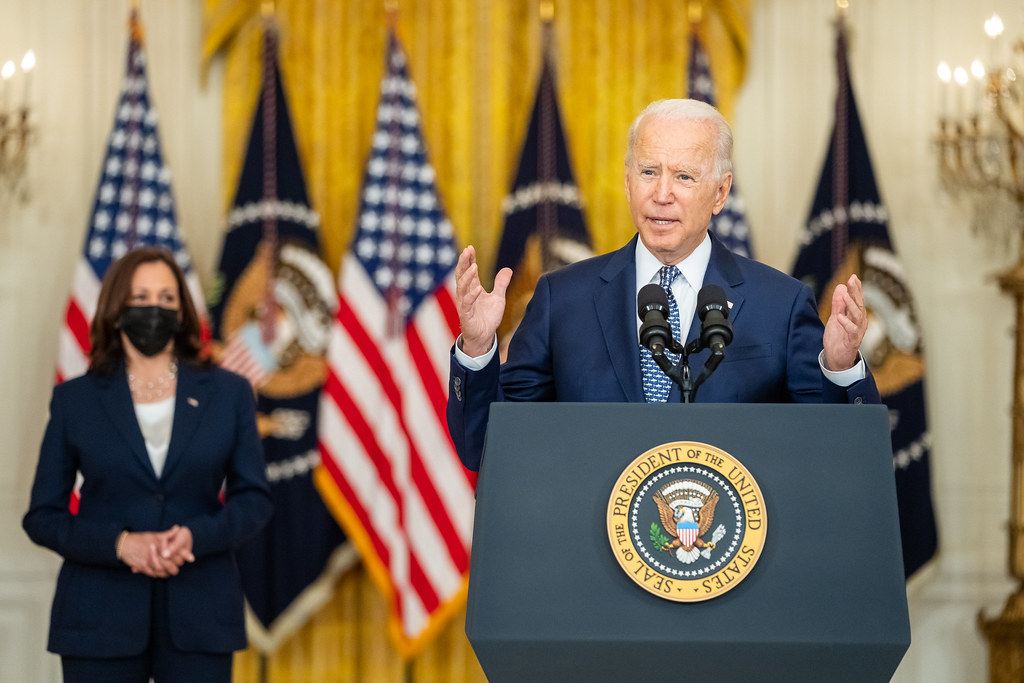The Biden Administration’s Aggressive Policy Changes to Combat Corruption
The Biden administration’s new strategy to combat corruption defines it as a national security risk to the economy and to democracy itself. But it is unclear how effective this plan will be against the broad range of harms it seeks to combat.

Published by The Lawfare Institute
in Cooperation With

On Dec. 6, the Biden administration unveiled the first-ever national security strategy memorandum focused on corruption. The strategy is the result of a federal interagency review process that President Biden initiated in June 2021, after concluding that corruption is a core threat to national security because of its effects on “economic equity, global antipoverty and development efforts, and democracy itself.” President Biden announced that stronger anti-corruption efforts would help democratic nations by “demonstrating the advantages of transparent and accountable governance.”
With such declarations, the strategy needed to be bold—and it is. The administration intends to focus federal resources on anti-corruption efforts across the globe. The strategy also contemplates engagement with the private sector by collaborating with companies interested in increasing compliance and prosecuting others who facilitate illicit transactions. But the Biden administration’s strategy also stresses the importance of the cooperation of entities outside of its control in order to achieve these goals. Therefore, even with a winning strategy, the Biden administration may not achieve its national security goals unless others agree to advance it.
For decades, federal prosecutors have emphasized the various dangers of corruption, including the loss of public trust in government and the advantages to criminals, who obtain a leg-up on ordinary citizens and legitimate businesses. Until now, however, the crime typically has been viewed from a criminal law lens.
But the Biden administration wants to change that. It announced that corruption constitutes not only a criminal offense but also a national security threat. It asserted that corruption “frequently reverberate[s] far beyond the immediate environment in which the acts take place.” Specifically, the administration found that corruption contributes to extremism and “provides authoritarian leaders a means to undermine democracies worldwide,” and concluded that corruption allows already recognized national security threats like drug cartels, rogue nations and terrorist networks to thrive.
These public harms are not new; nor are law enforcement efforts to counter them. Many local and even federal law enforcement agents, for example, have been convicted for assisting international narcotics traffickers. What is different, however, is the scope of problems the Biden administration has decided to target through its anti-corruption efforts. It seeks to combat corruption as a means of mitigating a broad range of national security threats, which it says includes the erosion of democracies and the existence of inequities facing underprivileged people across the globe. The problems with corruption, according to the Biden administration, are expansive, affecting nations’ economies, democratic ideologies, and governments’ obligations to their citizens. In labeling corruption a national security threat and developing a strategy to combat it, the Biden administration boldly takes on these broad and serious issues.
The Biden administration controls some aspects of the anti-corruption effort that are likely to result in meaningful change. First, expanding what constitutes a national security threat to include corruption means there will be a reallocation of law enforcement and other resources to fight corruption. While federal agencies have viewed corruption as a top criminal threat to the U.S. for several decades, the 9/11 attacks caused them to shift resources away from white-collar crime to national security issues, which at the time were not considered to include corruption. More than 20 years later, the Biden administration’s new strategy means that federal agencies will move some of the resources they had been devoting to more traditional national security threats, like terrorism and espionage, to investigating and prosecuting bribery of foreign and domestic public officials.
Second, the Biden administration’s focus on altering the behavior of the corporate world, including through more transparency in financial transactions and assets, is vital to strengthening trust in the government. For example, corrupt actors often try to disguise illicit payments through real estate transactions and shell corporations. In an attempt to curtail such money laundering, the Biden administration is warning law firms, banks and other corporations in the private sector that they will be held accountable for facilitating these arrangements for corrupt officials. It is no coincidence that the tough talk came only weeks after the International Consortium of Investigative Journalists published the Pandora Papers, which further exposed the role that these professionals play and showed that little has changed since the same consortium revealed similar conduct six years ago in the Panama Papers.
Some of the anti-corruption strategy’s implementation—and therefore success—will depend, however, on actors outside of the Biden administration’s control. For example, while the strategy touts more aggressive federal enforcement of corruption laws, like the Foreign Corrupt Practices Act (FCPA), it also promotes the need for foreign governments, U.S. states and local prosecutors to increase their own anti-corruption efforts. And while the strategy promises that federal agencies will adopt new anti-corruption regulations that will make it easier for the U.S. to learn about foreign public officials’ real estate holdings and corporate ownership, it also asks Congress to pass more expansive anti-corruption laws that would include amending the FCPA so that foreign bribe takers can be prosecuted under the law in U.S. district courts. (Currently, the FCPA outlaws giving bribes, but not accepting them.) Therefore, the Biden administration believes that current laws are not enough to deter foreign officials from taking bribes. While this point can be debated—plenty of other federal statutes, such as conspiracy, wire fraud, and extortion, could theoretically be used to prosecute foreign officials for taking bribes—a threatened or actual expansion of the FCPA might incentivize other countries to crack down on their own corrupt public officials if they do not want the U.S. intervening in their affairs. Through these calls to action, the Biden administration recognizes that any changes that the White House implements on its own will not be sufficient if the federal government cannot obtain the help of others.
The Strategy on Countering Corruption
The Biden administration’s anti-corruption strategy promotes a “whole-of-government” approach to fighting corruption that will rely not just on aggressive federal criminal enforcement through the Department of Justice but also a combined effort by the intelligence community and the departments of State, Commerce and Treasury to achieve its goals. The strategy also contemplates convincing the private sector to strengthen its compliance with anti-money laundering and anti-corruption laws.
The strategy is built on what the administration calls five mutually reinforcing pillars:
Pillar 1: Modernizing, Coordinating and Resourcing U.S. Government Efforts to Fight Corruption
Consistent with its view that corruption is a national security threat, the administration will prioritize gathering intelligence on corrupt actors and will “bolster information sharing between the Intelligence Community and law enforcement.” It will also create an anti-corruption task force at the Department of Commerce and devote more law enforcement resources to anti-corruption efforts.
Pillar 2: Curbing Illicit Finance
The administration’s plan targets current deficiencies in U.S. anti-money laundering laws and enforcement. In particular, through new regulations and intelligence gathering, the administration will attempt to collect information and build databases on corporate ownership, including shell companies, and real estate transactions. The goal is for the U.S. and foreign governments to learn whether assets and transactions are used to hide ill-gotten cash or launder criminal proceeds. If the U.S. can successfully obtain this information, it would lead to more corruption and money laundering prosecutions and the U.S. bringing additional criminal and civil proceedings to try to have allegedly tainted proceeds forfeited to the government.
Pillar 3: Holding Corrupt Actors Accountable
The strategy discusses how the administration will advance its objectives by “vigorously pursuing the enforcement” of the FCPA, money laundering laws and forfeiture statutes. But the administration is not going to settle for enforcing existing laws. Notably, the administration states that it will work with Congress to enact statutes further enabling the prosecution, in U.S. federal courts, of foreign public officials who demand bribes. Even if such laws are enacted, there would be diplomatic issues that would need to be addressed before the U.S. would bring allegedly corrupt foreign public officials to court.
The strategy also establishes a pilot kleptocracy asset recovery program through the Treasury Department, coordinates international law enforcement actions through the State Department, and pledges that the administration will work with the private sector to adopt anti-corruption compliance programs.
Pillar 4: Preserving and Strengthening the Multilateral Anti-Corruption Architecture
Here, the administration highlights its current efforts to bring anti-corruption priorities before NATO, the Group of 20, and the Group of 7, and pledges to strengthen those efforts moving forward. Also in this pillar, the administration issues a mild and vague warning that it will “hold accountable” partners who fail to live up to their existing anti-corruption obligations—though it does not specify how it will do so.
Pillar 5: Improving Diplomatic Engagement and Leveraging Foreign Assistance Resources to Advance Policy Objectives
The strategy’s fifth and final pillar focuses on ensuring that the assistance given to foreign governments is substantial and effective. This will include bolstering foreign governments’ oversight and corruption-preventing capacities as well as attempting to ensure that money devoted to foreign assistance is not “diverted” or used to “inadvertently reinforce corrupt power structures.” Under this pillar, the administration also commits to protecting anti-corruption actors, including investigative journalism coalitions.
The Implementation
Many of these objectives and pillars contain few specifics. The Biden administration, however, took its first step to detailing and implementing its strategy days after its unveiling. On Dec. 9, the administration announced that it would provide up to $424 million in foreign funding to meet some of the strategy’s objectives through the Presidential Initiative for Democratic Renewal, and gave some insight into specifically how this money will be budgeted. The administration made clear that the money would be supporting many of the objectives of its strategy, including those in Pillars 1, 2 and 5. The initiative promises to fund measures to protect investigative journalists and whistleblowers, create initiatives to help strengthen other countries’ anti-corruption efforts, launch groups designed to advance human rights and diversity, and establish methods to further election integrity and promote democracies.
In addition to providing funding and detail, the administration began pursuing its diplomatic efforts discussed in Pillar 4 at the inaugural Summit for Democracy, which it held in December with other nations and members of the private sector. President Biden touted the anti-corruption strategy, which he said “elevates our fight against transnational corruption.” He emphasized that attendees should help “improve transparency,” “hold corrupt actors accountable,” and reduce the ability to use “financial systems to hide assets and to launder money.”
Also at the summit, U.S. Treasury Secretary Janet Yellen called out professionals and countries that the U.S. believes are enabling money laundering and corruption. Secretary Yellen committed to ensuring that corrupt leaders would no longer be able to hide their ill-gotten money in shell companies and real estate in the U.S.
Takeaways
The Biden administration’s goals in fighting corruption are ambitious and aggressive. By calling corruption a national security concern and emphasizing anti-corruption efforts as key to strengthening democracy, the administration is signaling how important it views the issue and how much energy it will put into advancing these initiatives.
With that said, it is not clear that the strategy has the potential to meet its extremely lofty goals. This strategy is taking on complex and wide-ranging societal issues that the federal government has been trying to manage for decades. For example, while there is no doubt that corruption helps international cartels that are engaged in narcotics trafficking, the Biden administration will have to do more than simply shift its own resources to win the war on drugs (assuming it is even winnable). Anti-corruption efforts are also not enough to end the erosion of democracies, as illicit money is not always needed to undermine democratic institutions. Stopping corruption across the globe will not significantly narrow economic gaps in the U.S. when other issues also cause education, health and income inequities. While its goals are ambitious, the strategy only scratches the surface of these complex societal issues and, therefore, is unlikely to fully solve any of the problems at hand.
The administration’s strategy, however, could help reduce global corruption, which is an attainable goal that is worthy on its own. Some of the administration’s announced efforts, including the $424 million funding of the presidential initiative, are likely to add meaningful resources to the fight. The new transparency laws and the Biden administration’s strong words for the private sector should cause law firms, banks, and other corporate entities to be proactive and conduct self-assessments of their legal risks. If the administration is successful at having the public see corruption as a national security issue, companies under federal investigation could face even greater existential threats than those they currently confront.
Parts of the strategy will be difficult to implement, especially when the administration is calling on other governmental components to act. The lack of cooperation between U.S. political parties should cause everyone to be pessimistic about Congress expanding the FCPA to criminalize the taking of bribes by foreign public officials.
While the White House might find some success by using diplomacy to convince foreign governments to prosecute corruption more aggressively, the degree of change and effectiveness will be hard to measure. The administration has threatened to hold countries accountable if they do not increase their anti-corruption enforcement, but it is not clear what the administration means and whether it is realistic to pull funding or impose sanctions against a country that fails to live up to standards.
Even lobbying state and local prosecutors to help stop domestic bribery will be difficult. The administration will have a hard time convincing them to divert resources from prosecuting street crime amid rising murder rates, when local law enforcement generally considers national security to be an issue for the federal government.
Accordingly, the two most visible changes likely to result from the Biden administration’s strategy are increased resources for fighting corruption and increased awareness in the private sector. Will that be enough for the administration’s efforts to succeed? Likely not, if measured by the lofty goals the Biden administration has placed on itself. But if it is correct that corruption is a national security issue and a threat to democracy, even changes that incrementally reduce global corruption and mitigate its effects may be enough for the strategy to have positive effects that are worth the investment








